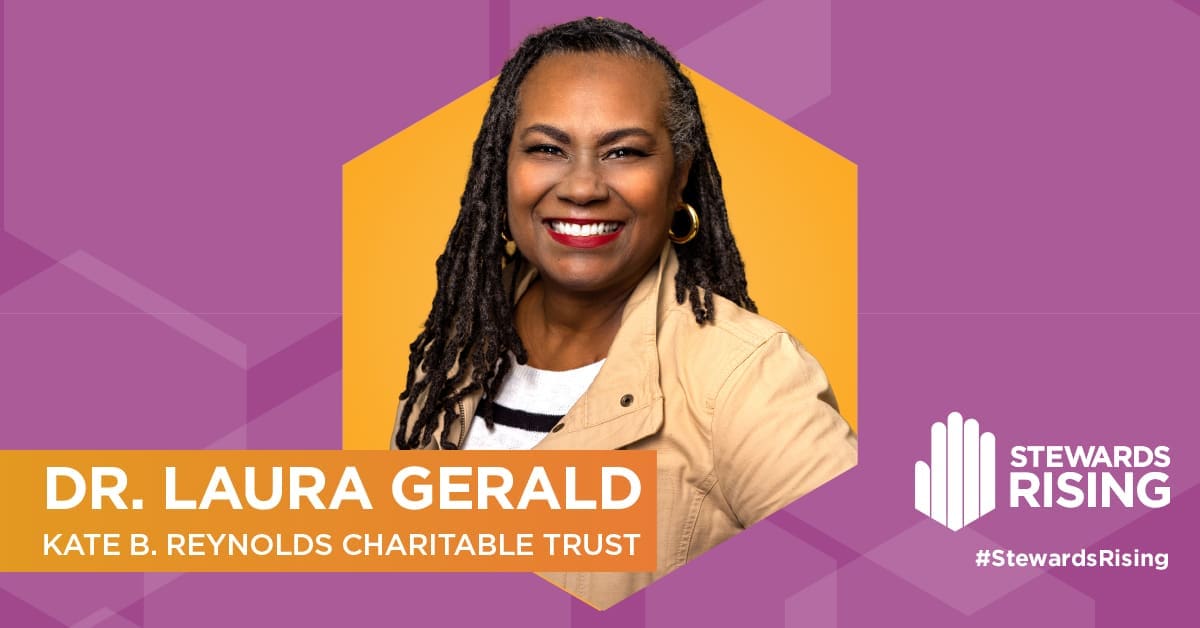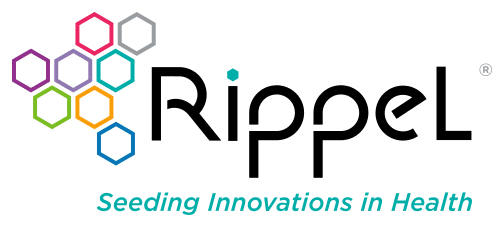In North Carolina, A Steward Confronts Structural Racism and Unjust Legacies to Build a Thriving Future

Dr. Laura Gerald, President, Kate B. Reynolds Charitable Trust
Stewards work with others to create the conditions that everyone needs to thrive, beginning with those who are struggling and suffering. But what happens when a steward recognizes that to be in deeper, trusting relationships with the people an organization serves, you must acknowledge the role your organization has played in causing harm? If you are Dr. Laura Gerald, president of the Kate B. Reynolds Charitable Trust in North Carolina, you confront it, head on. Because stewardship takes courage. Reflection. Transparency. And the ability to reckon with the past and cultivate shared aspirations for a future built for well-being, equity, and racial justice.
Growing up in Lumberton, NC, Dr. Laura Gerald didn’t see structural racism. As a child, she saw only her community’s rich tapestry—neighbors, Girl Scout leaders, teachers, and faith leaders—the people who wove together a network of support for her family after her mother was widowed when Dr. Gerald was just three years old. It was later as an adult that she understood the truth beneath the surface.
In much the same way that Dr. Gerald came to confront her community’s history, she is leading the Kate B. Reynolds Charitable Trust (the Trust) to reckon with its own. She and her team knew the Trust’s 75th anniversary was the time for transparency about the origin of the foundation’s wealth to lay the groundwork for racial equity and systems change.
“The truth of our history is that the house of KBR is built on a foundation that is characterized by the extraction of labor from Black people and a wealth generated from tobacco, which has caused tremendous death, disease, and chronic illness,” Dr. Gerald told a crowd gathered to mark the Trust’s 75th anniversary, one of four events held during 2023 throughout the North Carolina rural communities that the Trust serves. “We must work to repair our foundation. We may not be responsible for the conditions of that foundation, but if we are to live in this house, we are responsible for repairing it.”
"I learned as a fully grown adult how under-resourced and overwhelmed my community really was—how we're often at the bottom of any economic indicators and health rankings,” she said. “But growing up, thankfully, I didn't experience that. I come to this work with a keen understanding of the strengths that are embodied in so many communities that have been traumatized and marginalized over centuries.”
A multisolver for equity
As a steward, Dr. Gerald has never shied away from the complexity of repairing broken systems. She is drawn to them. When she was in practice as a pediatrician, she often looked upstream to the reasons why her patients weren’t well. “Working one-on-one with patients, I realized I could stamp out colds in Lumberton, but I was not going to stamp out the real root causes of what was causing people to be ill,” she said.
She entered the field of public health where she could impact change at the population level. It led to her current role in philanthropy, which she sees as the culmination of all the professional experiences she’s had and the opportunity to multisolve as she leads the Trust on its racial equity journey, confronting its own history to change the system.
“I get to work across sectors and on problems from a variety of different angles and perspectives. We are up against serious, systemic, persistent barriers and traumas that need to be addressed. My experience growing up and working in Lumberton is a huge part of how I see the problems that we're facing today.”
A conduit for building trust and sharing power
Dr. Gerald sometimes refers to herself as “Laura from Lumberton,” proudly recalling her deep connection to community. She carries forward the value of “getting proximal” to break down barriers and create transparency in the communities the Trust serves.
“Community members and grantees have shared how our vulnerability and authenticity affected them, how it built trust because they weren't accustomed to hearing foundations or people in a position of privilege and power speaking that way. None of it is possible without trust, and there is no trust without truth.”
Systems leaders have taken notice, asking the foundation to be their trust intermediary. “Institutional actors have told us, ‘You are credible brokers of community relationships. Please help us to be in communication with people on the ground.’”
Dr. Gerald and her team are doing more than facilitating communication. They are building capacity and relationships with people who are affected, and then marrying them with institutional actors—the experts within systems who many times have created harm by making decisions without the people who are impacted being at the table. “It's helpful for institutions to be in real relationship with people. We try to bridge divides, create feedback loops, and map strengths and weaknesses. Then we can create solutions where systems can deliver needed services for people to be empowered.”
At the Trust, empowerment comes in all sizes. At a state level, the Trust is bridging connections between the Department of Health and Human Services and grassroots organizations to build capacity for communities to drive enrollment in Medicaid expansion. In a rural town in western North Carolina, the Trust has invested in the first Black-led nonprofit in the surrounding county, funding the organization to overcome racial divides and focus on the issues residents care about. The work began as a conversation in a church. Both are examples of how Dr. Gerald and her team support people who were systematically excluded from building systems in the past to help remake those systems and end health, educational, and economic disparities.
“I shouldn't be relegated to a certain existence because of the color of my skin or where I was born,” she explains. “My hope is that we do away with these imposed and false constructs on people that relegate them to a certain station in life. I want to see us all have an opportunity to live the life we want to live. I'm hopeful about that. I have two children. I have to be.”
A steward of legacy, past and future
As Dr. Gerald looks to the future, she values the trust and accountability bestowed on her. Despite the origins of the Trusts wealth, she feels a kinship with foundation benefactor Kate B. Reynolds—whom Dr. Gerald affectionately calls “Miss Kate”—and a responsibility to examine the root causes of the issues she cared about.
“If she didn’t intend for us to adapt, she would have just given her money to whatever was the cause of the day. That's how I see stewardship—not just living in the moment in which she died but continuing to adapt and evolve, knowing what we know today about what it takes to improve health.”
As Dr. Gerald stewards the Trust toward the future with an equity mindset, she continues to lead the pursuit of equity and truth within her own organization.
“You can never do out there what you cannot or refuse to do in here. We’re on our own equity journey and that's not finished. We will always be on that journey.”
